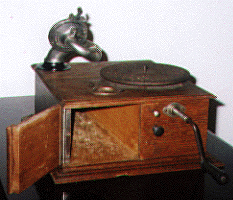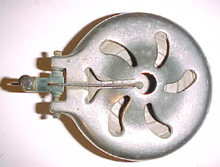Military Orophone? What's This?
Posted: Wed Jan 21, 2009 11:21 pm
Hi Everybody,
I have a couple of questions I can probably find answers to here, so here we go.
I have a Victrola VV-IX (I think, or it could be a VV-VIII, but it's located about 80 miles from where I am right now, so I can't go and check.) I bought this little tabletop machine when I was 14 or 15 years old, for the princely sum of $15. The cabinet doesn't look terribly beautiful, but it does look old, and the machine has always played reasonably well. It broke a spring once, and I replaced that, but otherwise I've never really done anything to it but play it, fairly sporadically over the past 10 years. My interest has been rekindled recently, thanks to boards like this one, so I've played the machine a bit more regularly these past couple of months, when I'm in the same location as the machine (which is stored at my second home, and I'm not there most of the time.)
Anyway, last weekend I moved the machine across the living room, and I heard the tone arm move under the closed lid, and it hit the side; not real hard, but enough to know that it happened. When I lifted the lid, the sound box and the swivel portion of the tone arm it mounts on were slanted. When I attempted to gently move them back into proper position, the swivel came apart from the taper tube.
 Question 1: In looking at the taper tube and the swivel section, it looks to me like they were soldered together (they are brass), but I'm not sure. How are these things assembled?
Question 1: In looking at the taper tube and the swivel section, it looks to me like they were soldered together (they are brass), but I'm not sure. How are these things assembled?
Since it was now loose in my hand, I took a closer look at the sound box than I ever have before. All these 35 (or so) years I have been assuming that this machine was all original. The sound box is painted black on the side opposite the needle clamp, and between the black color, the way it fit with the swivel arm-end and the generally dim light under the phono's lid, I had never been able to read the writing on it.
Well, now I can see what it says, and it doesn't say anything about Victor Talking Machine Co. Here's what it does say:
 NO. 90 MILITARY ORO-PHONE
NO. 90 MILITARY ORO-PHONE
THE ORO-TONE CO. CHICAGO U.S.A.
 Question 2: What is this thing? Have I been harboring a mild Frankenphone all these years?
Question 2: What is this thing? Have I been harboring a mild Frankenphone all these years?
It appears to be in basically good condition; no cracks or scars beyond normal wear & tear.
Thanks for any and all comments/observations/information.
Take care,
Jerry K
I have a couple of questions I can probably find answers to here, so here we go.
I have a Victrola VV-IX (I think, or it could be a VV-VIII, but it's located about 80 miles from where I am right now, so I can't go and check.) I bought this little tabletop machine when I was 14 or 15 years old, for the princely sum of $15. The cabinet doesn't look terribly beautiful, but it does look old, and the machine has always played reasonably well. It broke a spring once, and I replaced that, but otherwise I've never really done anything to it but play it, fairly sporadically over the past 10 years. My interest has been rekindled recently, thanks to boards like this one, so I've played the machine a bit more regularly these past couple of months, when I'm in the same location as the machine (which is stored at my second home, and I'm not there most of the time.)
Anyway, last weekend I moved the machine across the living room, and I heard the tone arm move under the closed lid, and it hit the side; not real hard, but enough to know that it happened. When I lifted the lid, the sound box and the swivel portion of the tone arm it mounts on were slanted. When I attempted to gently move them back into proper position, the swivel came apart from the taper tube.
Since it was now loose in my hand, I took a closer look at the sound box than I ever have before. All these 35 (or so) years I have been assuming that this machine was all original. The sound box is painted black on the side opposite the needle clamp, and between the black color, the way it fit with the swivel arm-end and the generally dim light under the phono's lid, I had never been able to read the writing on it.
Well, now I can see what it says, and it doesn't say anything about Victor Talking Machine Co. Here's what it does say:
THE ORO-TONE CO. CHICAGO U.S.A.
It appears to be in basically good condition; no cracks or scars beyond normal wear & tear.
Thanks for any and all comments/observations/information.
Take care,
Jerry K


